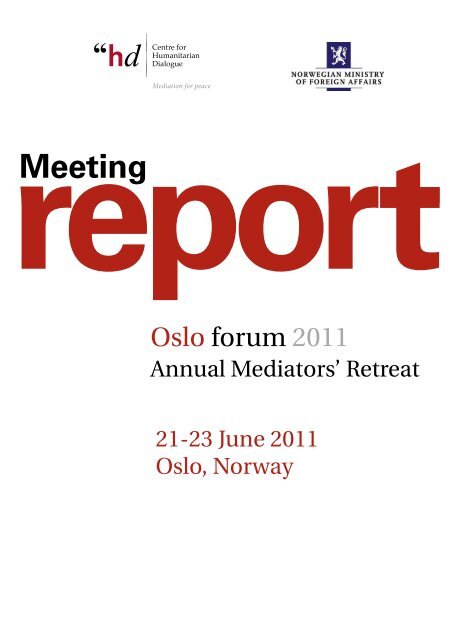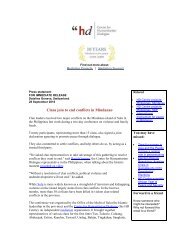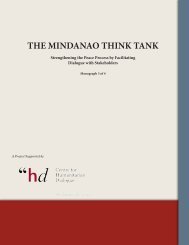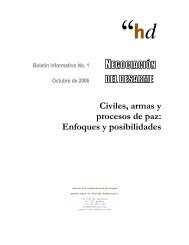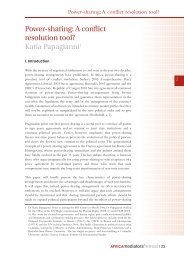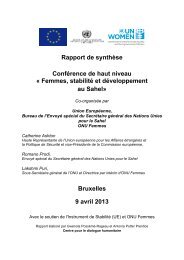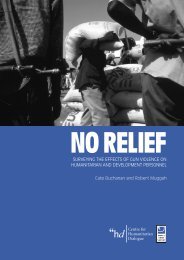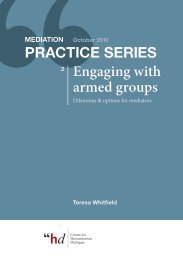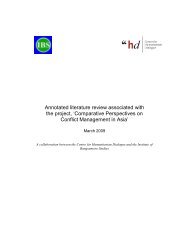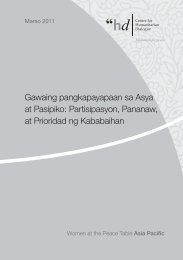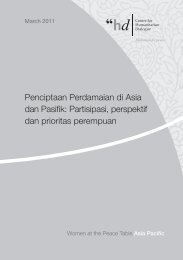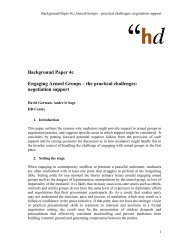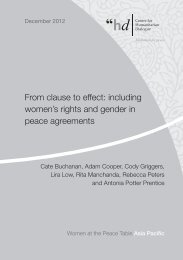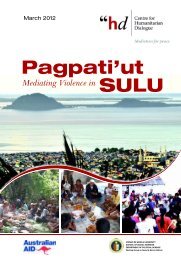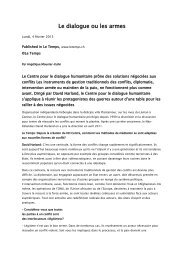Meeting report - Oslo forum 2011 - Centre for Humanitarian Dialogue
Meeting report - Oslo forum 2011 - Centre for Humanitarian Dialogue
Meeting report - Oslo forum 2011 - Centre for Humanitarian Dialogue
Create successful ePaper yourself
Turn your PDF publications into a flip-book with our unique Google optimized e-Paper software.
eport<br />
<strong>Meeting</strong><br />
<strong>Oslo</strong> <strong><strong>for</strong>um</strong> <strong>2011</strong><br />
Annual Mediators’ Retreat<br />
21-23 June <strong>2011</strong><br />
<strong>Oslo</strong>, Norway
What is the <strong>Oslo</strong> <strong><strong>for</strong>um</strong> network?<br />
A global series of mediation retreats<br />
The <strong>Oslo</strong> <strong><strong>for</strong>um</strong> is widely acknowledged as the leading international network of conflict mediation<br />
practitioners.<br />
Co-hosted by the Royal Norwegian Ministry of Foreign Affairs and the <strong>Centre</strong> <strong>for</strong> <strong>Humanitarian</strong><br />
<strong>Dialogue</strong>, the <strong>Oslo</strong> <strong><strong>for</strong>um</strong> regularly convenes conflict mediators, peacemakers, high-level decision<br />
makers and key peace process actors in a series of in<strong>for</strong>mal and discreet retreats.<br />
The <strong>Oslo</strong> <strong><strong>for</strong>um</strong> features an annual global event in <strong>Oslo</strong> and is complemented by regional retreats<br />
in Africa and Asia. The aim is to improve conflict mediation practice through open exchange and<br />
reflection across institutional and conceptual divides, as well as providing in<strong>for</strong>mal networking<br />
opportunities that encourage co-ordination and co-operation when needed.<br />
Sharing experiences and insights<br />
Mediation is increasingly seen as a successful means of resolving armed conflicts and the growing<br />
number of actors involved testifies to its emergence as a distinct field of international diplomacy.<br />
The pressured working environment during mediation processes rarely allows much opportunity<br />
<strong>for</strong> reflection. Given the complexity of today’s world and the immense challenges in bringing<br />
about sustainable negotiated solutions to violent conflict, mediators benefit from looking beyond<br />
their own particular experiences <strong>for</strong> inspiration, lessons and support.<br />
The uniquely in<strong>for</strong>mal and discreet retreats of the <strong>Oslo</strong> <strong><strong>for</strong>um</strong> series enable a frank and open<br />
exchange of insights by those working at the highest level to bring warring parties together to find<br />
negotiated solutions. By convening key actors from the United Nations, regional organisations and<br />
governments, as well as private organisations and noteworthy individuals, the retreats also provide a<br />
unique networking opportunity.<br />
Where politics meets practice<br />
Participation is by invitation only. All discussions are confidential and take place under the Chatham<br />
House rule. Sessions are designed to permit in<strong>for</strong>med exchanges with provocative inputs from a<br />
range of different speakers including conflict party representatives, war correspondents, outstanding<br />
analysts, and experts on specific issues.<br />
Participants have included Kofi Annan, <strong>for</strong>mer Secretary-General of the United Nations; President<br />
Martti Ahtisaari, President and Chairman of the Board of the Crisis Management Initiative and<br />
<strong>for</strong>mer President of Finland; President Mohammad Khatami, <strong>for</strong>mer President of the Islamic<br />
Republic of Iran; Dr Salim Ahmed Salim, <strong>for</strong>mer Secretary-General of the Organisation of African<br />
Unity and <strong>for</strong>mer Special Envoy of the African Union; Ambassador Thomas Pickering, <strong>for</strong>mer<br />
US Under-Secretary of State <strong>for</strong> Political Affairs; Gerry Adams, President of Sinn Féin; Dr Surin<br />
Pitsuwan, Secretary-General of the Association of Southeast Asian Nations and <strong>for</strong>mer Foreign<br />
Minister of Thailand; and many others.<br />
The retreats refrain from making specific recommendations or conclusions, aiming instead to define<br />
and advance conflict mediation practice.<br />
2
eport<br />
<strong>Meeting</strong><br />
The <strong>Centre</strong> <strong>for</strong><br />
<strong>Humanitarian</strong> <strong>Dialogue</strong><br />
(HD <strong>Centre</strong>) is an<br />
independent mediation<br />
organisation dedicated<br />
to helping improve the<br />
global response to armed<br />
conflict. It attempts to<br />
achieve this by mediating<br />
between warring parties<br />
and providing support to<br />
the broader mediation<br />
community<br />
114, rue de lausanne<br />
ch-1202<br />
geneva<br />
switzerland<br />
info@hdcentre.org<br />
t: + 41 22 908 11 30<br />
f: +41 22 908 11 40<br />
www.hdcentre.org<br />
© Copyright<br />
Henry Dunant <strong>Centre</strong><br />
<strong>for</strong> <strong>Humanitarian</strong><br />
<strong>Dialogue</strong>, <strong>2011</strong><br />
Reproduction of all or<br />
part of this publication<br />
may be authorised only<br />
with written consent and<br />
acknowledgement of the<br />
source.<br />
Contents<br />
Executive summary<br />
<strong>Oslo</strong> <strong><strong>for</strong>um</strong> <strong>2011</strong> agenda<br />
Opening plenary<br />
Talking to the Taliban: topics <strong>for</strong> peace<br />
Comprehensive support <strong>for</strong> peace processes:<br />
The case of Sudan<br />
As spring turns to summer - Opportunities <strong>for</strong><br />
peacemaking in the Middle East and North Africa<br />
Côte d'Ivoire: old threats, renewed conflict<br />
Track II Mediation: Unpacking the process, exploring<br />
the potential<br />
Mediators: getting organised against organised crime<br />
Reality Check Session - Gender in mediation:<br />
Why all the fuss?<br />
5<br />
6<br />
8<br />
9<br />
10<br />
12<br />
14<br />
15<br />
16<br />
17<br />
Reality Check Session - Can mediation be<br />
evaluated?<br />
Reality Check Session - Why bother including<br />
civil society in peace processes?<br />
Conclusions and reflections<br />
<strong>Oslo</strong> <strong><strong>for</strong>um</strong> <strong>2011</strong> - List of participants<br />
19<br />
20<br />
22<br />
23<br />
3
Executive summary<br />
The <strong>Oslo</strong> <strong><strong>for</strong>um</strong> <strong>2011</strong> was held just outside <strong>Oslo</strong>, Norway from the 21 st to 23 rd June. Some<br />
90 participants gathered to exchange experiences and to reflect critically on the practice of<br />
mediation.<br />
The variety of participants reflected the growing number of actors mediating armed conflict,<br />
ranging from government and private actors to international and regional organisations. Eminent<br />
personalities who attended included: Norwegian Minister of Foreign Affairs, Jonas Gahr<br />
Støre; Qatari Assistant Foreign Minister For Follow-up Affairs, Mohammed Bin Abdullah<br />
Bin Mutib Al Rumaihi; South Africa Deputy Minister of International Relations and Cooperation,<br />
Marius Llewellyn Fransman; and Special Representative of the President of the<br />
Russian Federation <strong>for</strong> Afghanistan, Zamir Kabulov.<br />
This year participants also came from Afghanistan, China, Germany, Israel, Jordan, Kyrgyzstan,<br />
Liberia, Pakistan and the United States.<br />
Thanks to the exceptional variety of perspectives, discussions at the <strong>Oslo</strong> <strong><strong>for</strong>um</strong> <strong>2011</strong> were<br />
particularly rich and animated. After welcome introductions from David Harland, HD <strong>Centre</strong><br />
Executive Director, the retreat opened with a moderated plenary discussion on the situation<br />
in Afghanistan. During the course of the following two days, participants delved into many of<br />
today’s seemingly intractable problems – from identifying contents of talks with the Taliban, to<br />
the situations in Sudan and Côte d’Ivoire, and the new opportunities <strong>for</strong> peacemaking in the<br />
Middle East and North Africa. Reports on the current situations in Libya, Southern Thailand<br />
and the Sahel region were also presented at the <strong><strong>for</strong>um</strong>. Conflict-specific sessions were complemented<br />
by analyses of what Track I mediation actors can learn from Track II processes; and<br />
by exchanges on ways <strong>for</strong> mediators to mitigate the impact of transnational organised crime<br />
when negotiating agreements. Several other debates questioned commonly held assumptions<br />
about the advantages and constraints associated with the inclusion of civil society in mediation<br />
processes; the desirability of evaluating mediation; and the inclusion of gender-related issues in<br />
mediation.<br />
The Mediators’ Studio, with Governor William Richardson, was a particular highlight of<br />
this year’s retreat. Lyse Doucet of the BBC invited the Governor to reflect on his practice of<br />
negotiations in North Korea, Afghanistan, Cuba, Sudan and Iraq. This frank interview revealed<br />
captivating insights into his strategies and techniques (including personal interactions, preparations<br />
and steps) as well as his frustrations. Governor Richardson highlighted, among other<br />
reflections, the differences between his short, targeted missions and the usually year-long<br />
involvement of mediators in peacemaking ef<strong>for</strong>ts.<br />
The <strong>Oslo</strong> <strong><strong>for</strong>um</strong> <strong>2011</strong> ended with a lively discussion summarising the overall impressions,<br />
underlying issues and unsolved dilemmas from the debates.<br />
All of the discussions took place in an in<strong>for</strong>mal and discreet setting, and were subject to the<br />
Chatham House rule. This brief <strong>report</strong> summarises the discussions and highlights a number<br />
of cross-cutting issues which emerged during the retreat. Background material <strong>for</strong> the <strong>Oslo</strong><br />
<strong><strong>for</strong>um</strong> <strong>2011</strong> is also available on the <strong>Oslo</strong> <strong><strong>for</strong>um</strong> website (www.oslo<strong><strong>for</strong>um</strong>.org).<br />
5
<strong>Oslo</strong> <strong><strong>for</strong>um</strong> <strong>2011</strong> Agenda<br />
21 Tuesday<br />
June <strong>2011</strong><br />
16.00–17.30<br />
Welcome and high level opening plenary<br />
Welcome words by Dr David Harland followed by a high level discussion on Afghanistan<br />
including Minister Jonas Gahr Støre, Ambassador Zamir Kabulov, Ambassador Staffan de<br />
Mistura, and H.E. Mohammad Masoon Stanekzai, moderated by Mr James Traub.<br />
19.30<br />
Reception<br />
20.00<br />
Formal opening dinner<br />
22<br />
Wednesday<br />
June <strong>2011</strong><br />
9.00–10.00<br />
A choice of up-to-date<br />
situation <strong>report</strong>s<br />
Sahel region Libya Southern Thailand<br />
10.30–12.30<br />
Two parallel discussions <strong>for</strong><br />
participants to choose from<br />
13.00–14.30<br />
Côte d'Ivoire: old threats, renewed<br />
conflict<br />
In<strong>for</strong>mal lunch<br />
As spring turns to summer - Opportunities<br />
<strong>for</strong> peacemaking in the Middle East and<br />
North Africa<br />
15.00-17.00<br />
Two parallel discussions <strong>for</strong><br />
participants to choose from<br />
Mediators: Getting<br />
organised against organised crime<br />
Track II Mediation: Unpacking the process,<br />
exploring the potential<br />
18.00–19.00<br />
The Mediators' Studio<br />
with Governor William Richardson<br />
19.30<br />
In<strong>for</strong>mal dinner<br />
6
23 Thursday<br />
June <strong>2011</strong><br />
9.00–10.00<br />
A choice of reality<br />
check sessions<br />
Can mediation Why bother including Gender in mediation:<br />
be evaluated? civil society? Why all the fuss?<br />
10.30–12.30<br />
Two parallel discussions <strong>for</strong><br />
participants to choose from<br />
Comprehensive support <strong>for</strong> peace<br />
processes: The case of Sudan<br />
Talking to the Taliban:<br />
topics <strong>for</strong> peace<br />
13.00–14.30<br />
In<strong>for</strong>mal Lunch<br />
15.00 – 16.30<br />
Closing plenary<br />
19.00<br />
Key challenges and opportunities <strong>for</strong> mediation<br />
in the coming months<br />
Boat excursion with dinner<br />
7
Opening plenary<br />
During this session, panellists and participants discussed fundamental dilemmas and topical<br />
issues pertaining to Afghanistan’s transitional period.<br />
As the country moves towards reconciliation and a negotiated settlement with the Taliban,<br />
most participants felt that the political process must make headway on substantive issues<br />
at all levels: national, regional and international. Some participants stressed that the initiatives<br />
carried out at these various levels need to ultimately converge into a process that is<br />
Afghan-led and that draws on crucial support from external actors such as Russia, Pakistan,<br />
the United States, India, China and Iran. The goal should be to build Afghan capacity <strong>for</strong><br />
political dialogue rather than set up parallel power structures and disconnected processes.<br />
Other participants contended that inter-ethnic tensions as well as socio-economic factors<br />
continue to strain Afghan reconciliation ef<strong>for</strong>ts. In this context, it was deemed essential that<br />
relevant external actors with a significant stake in the process help drive it <strong>for</strong>ward and contribute<br />
to a regionally sustainable solution.<br />
The session further examined the multiple challenges Afghanistan is facing in relation to<br />
regional politics. One contributor argued that geo-strategic interests like those governing<br />
the Pakistan-Afghanistan relationship can only be determined by the two stakeholders<br />
themselves and not the outside world. Others insisted that the security dilemma confronting<br />
the region inherently draws in other nations as well and all regional powers seek an<br />
Afghan solution that poses no threat to their security.<br />
The participants also noted that Afghanistan is definitely entering a transitional period but<br />
that so far the process seems to lack direction. Against this background, participants debated<br />
the priorities to be pursued including whether there should be a focus on security and stabilisation;<br />
on good governance, development and socio-economic issues; or on justice and<br />
human rights.<br />
Moving on to the visions which Afghans themselves have <strong>for</strong> their future, the session noted<br />
that ordinary citizens aspire towards security, development and justice. Participants stressed<br />
that Afghanistan is now at a crossroads, with the opportunity to accelerate reconciliation<br />
ef<strong>for</strong>ts and to test the lessons they have presumably learned. Concerns over shortcuts that<br />
will sacrifice hard-won rights were also voiced during the session.<br />
Finally, participants agreed that the main lessons <strong>for</strong> all stakeholders are associated with<br />
commitment and inclusion. Commitment entails proper preparations <strong>for</strong> the 2014 handover<br />
and continued international assistance thereafter, while inclusion calls <strong>for</strong> more<br />
reaching out to all Afghans who feel their homeland is threatened.<br />
8
Talking to the Taliban: topics <strong>for</strong> peace<br />
During this roundtable discussion there was general agreement that there should be talks<br />
with the Taliban. Some participants saw them as being at the stage of confidence-building<br />
measures, while others were already discussing the substance of talks. The discussion also<br />
drew on the exchanges during the opening session, where participants had stressed the need<br />
<strong>for</strong> co-operation at the local, national, regional and international level, as well as stressing the<br />
challenges and opportunities in the current transitional period.<br />
Many participants agreed that a basic understanding between all parties should entail: 1) the<br />
respect of basic humanitarian principles, 2) abidance with the Constitution, and 3) the fact that<br />
the Taliban movement should cut ties with Al Qaeda. Notably, these were the outcomes which<br />
were sought rather than pre-conditions <strong>for</strong> talks. Some participants stressed that the country<br />
was tired of war and that it was a good moment in time to pave the way <strong>for</strong> peace.<br />
One of the central questions of the discussions was what role the Afghans, and in particular the<br />
Afghan Government, should play in the peace talks. Some criticised the fact that the Afghan<br />
High Peace Council only included members appointed by President Karzai. Many argued that<br />
the peace talks should be “Afghan led”, while some argued that the process needs to be driven<br />
<strong>for</strong>ward by those in a position to do so but with the ‘blessing’ of the Afghans.<br />
The question of who can represent the Taliban also emerged during the discussion. Some<br />
participants argued that Mullah Omar still had the power to command, whereas others<br />
doubted that he would be able to speak <strong>for</strong> all Taliban and noted that the Haqqani network<br />
and Hekmatyar would surely not follow his lead. It was noted that neither Afghans nor the<br />
international community was united in their message on talks.<br />
The session also touched on the issues of the re<strong>for</strong>m of the Constitution, the decentralisation of<br />
power and the sharing of power between different ethnic and religious groups in the country.<br />
Participants also examined the ongoing transition and the handover to Afghan security <strong>for</strong>ces.<br />
Concerns were voiced about the US presence in the region beyond 2014 and the fact that the<br />
Guantanamo Bay detention camp had not yet been closed. Some stressed that, in order to win<br />
the Taliban’s trust, the US needs to send positive signals and grant some of them a guarantee<br />
that they would not be killed. Another participant pointed out that the US had already taken<br />
some Taliban off their terrorism list, and that this was to be seen as a first positive signal. It was<br />
also noted that the international community wanted to make sure that Afghanistan was safe <strong>for</strong><br />
Afghans, but also that no threat to other states came from Afghanistan.<br />
Towards the end, a participant stressed that the idea of a political solution rather than a<br />
military solution was not new and had been supported by European countries <strong>for</strong> a long time<br />
be<strong>for</strong>e the US took it up. Overall, participants agreed that the international community and<br />
the countries in the region should not lose any more time and needed to support the Afghan<br />
ef<strong>for</strong>t to create peace.<br />
9
Comprehensive support <strong>for</strong> peace<br />
processes: the case of Sudan<br />
Given the critical juncture that Sudan was at, with only weeks to Southern independence<br />
as well as new crises emerging in Abyei and Southern Kordofan, the discussion focused as<br />
much on reviewing the present situation as reflecting on the achievements and challenges<br />
of the implementation of the Comprehensive Peace Agreement (CPA). It was noted that<br />
important progress on implementation had been made – including on security arrangements<br />
– through the CPA Interim Period. The Assessment and Evaluation Commission had<br />
achieved some positive results in its evaluation of the implementation of the CPA but it<br />
was felt that some considerable limitations had been imposed on its autonomy and the<br />
possibilities <strong>for</strong> follow-up activities.<br />
When discussing the constraints involved in this particular peace process, some participants<br />
stressed that untangling the web of sanctions imposed on Sudan by the international<br />
community, and dealing with the impact of the International Criminal Court indictment,<br />
were not easy from an administrative and political perspective. Participants noted that it is<br />
a huge difficulty <strong>for</strong> the United States and others to be unable to speak directly to Sudan<br />
President Omar al-Bashir. This crucial aspect of diplomacy has been missing <strong>for</strong> some years<br />
even though most of the decisions regarding the future of the country rest with him. There<br />
was a general feeling that this should be a lesson to be learnt <strong>for</strong> other peace processes:<br />
decisions on sanctions should be thought through carefully be<strong>for</strong>e being imposed as it is<br />
terribly difficult to get out of these structures.<br />
The discussion then turned to the remaining issues that need to be resolved as quickly<br />
as possible in Sudan. Some participants wondered whether the pending issues could<br />
be negotiated as a package with tradeoffs and debated the merits of separating out the<br />
issues rather than taking a comprehensive approach. Participants stressed multiple current<br />
concerns in Sudan including fighting in the Southern Kordofan and Abyei areas, and<br />
increased tensions in The Blue Nile State. Participants discussed the situation in Southern<br />
Kordofan State in more depth as it was felt that the military operations there could be a<br />
major detonator <strong>for</strong> broader conflict beyond the ongoing violence in that State. Concerns<br />
of a spill-over effect into Blue Nile State were also raised.<br />
Challenges were also highlighted <strong>for</strong> both Sudan and South Sudan in the coming period.<br />
Participants agreed that a major challenge <strong>for</strong> South Sudan post-independence is to deliver<br />
on the very high expectations people have <strong>for</strong> the new State. Given the overwhelming<br />
proportion of the state budget spent on the military (70%), this will be a particularly difficult<br />
challenge. Participants argued that, as a priority, South Sudan needs civilian oversight of the<br />
army. It was suggested that South Sudan effectively needs a political ministry of defence,<br />
with real capacity to relegate the Sudan People’s Liberation Army (SPLA) to becoming<br />
a professional national army, not a political <strong>for</strong>ce as it is now. Economic viability in the<br />
North was also highlighted as equally critical and of serious concern at the present time.<br />
10
Finally, on the subject of the mediation ef<strong>for</strong>ts being undertaken, it was felt that the process<br />
has been hampered by the proliferation of actors around the mediation in Sudan. Participants<br />
shared the feeling that <strong>for</strong>mer South African President Thabo Mbeki should be supported in<br />
taking a lead role when co-ordinating the myriad of Special envoys, Foreign Ministers and<br />
Prime Ministers who play a role in the process.<br />
Note: The session did not include representatives from Sudan although it was widely<br />
acknowledged that the discussion would have greatly benefited from exchanging with the<br />
parties involved. However, it was also widely agreed that it was right that key stakeholders<br />
were not distracted from talks during the last crucial weeks be<strong>for</strong>e South Sudan’s<br />
independence.<br />
11
As spring turns to summer:<br />
Opportunities <strong>for</strong> peacemaking in the<br />
Middle East and North Africa<br />
The <strong>2011</strong> Arab spring was assessed as a very positive development <strong>for</strong> the region in which<br />
young people played a prominent role. While everyone seemed to agree that this opened<br />
new opportunities that needed to be shaped, views diverged on how best to go about<br />
this. Some favoured a slow approach to transition which included a thorough creation of<br />
institutions and a period of “normal political activity” followed by elections; others warned<br />
that a prolonged period of instability was detrimental to the economy, which in itself would<br />
further instability. Either approach to transition would have an impact on countries such as<br />
Egypt or Tunisia where elections are coming up.<br />
Comparing different countries in the region, participants noted that it was hard to<br />
explain why some countries turned violent so quickly while others, like Yemen, remained<br />
remarkably peaceful - particularly given the high number of armed groups and the<br />
availability of small arms and light weapons.<br />
A good share of the debate dealt with the situation in Syria. The three pillars of President<br />
Bashar al-Assad’s power were identified as the Alawite movement, some parts of the security<br />
<strong>for</strong>ces and some parts of the business elites. While at the moment they were still seen as<br />
supporting the government, defections and divisions could still happen. It was felt that the<br />
Syrian regime may not have the means to become more repressive in order to maintain its<br />
power. Unlike Libya, it may soon lack the military and the economic means, particularly<br />
since some of the business elite have started to support the opposition.<br />
In the eyes of many participants in the room, it was just a question of time be<strong>for</strong>e President<br />
al-Assad would have to leave. In the meantime there would be more bloodshed and<br />
discussants weighed different options on how to best support the change of government.<br />
In order to achieve this, some participants raised the possibility of dialogue and a mediation<br />
track, which would probably not work unless it led to an “exit deal” <strong>for</strong> al-Assad. Others<br />
favoured political pressure, sanctions, and the involvement of the International Criminal<br />
Court. A military intervention was also considered, although most participants ruled out<br />
this option mainly due to Syria’s powerful position in the region, a lack of willingness of<br />
allies to intervene, as well as NATO allies’ stretched resources. In contrast, it was also stressed<br />
that the international community had an obligation to protect civilians, including in Syria,<br />
and that the question of resources and operational lead should be secondary to the question<br />
of the protection of civilians.<br />
Overall it was emphasised that Syria, long seen as a stronghold of stability, had now become<br />
a source of instability in the region mostly - but not only - to its neighbours, in particular<br />
Turkey. This internal instability also makes Syria more prone to external interference<br />
particularly from Turkey, Iran and Saudi Arabia.<br />
12
With regard to the region in general, there was agreement that many governments have<br />
mismanaged the issue of minorities <strong>for</strong> too long and that the granting of their rights and<br />
their inclusion was central to peace in the region. Confidence-building measures by the new<br />
governments will be necessary. At the same time, it was argued that sectarian violence in the<br />
region should not be over-emphasised, as this might be detrimental to peace.<br />
The discussion underlined the point that it was crucial to ensure that the international<br />
community talks to the right interlocutors, including extremists, in order to have a comprehensive<br />
understanding of the situation.<br />
13
Côte d'Ivoire: old threats, renewed conflict<br />
This session prompted participants to look back at the enduring signs of Ivorian unrest, the<br />
ef<strong>for</strong>ts and principles guiding external involvement in the different phases of the Ivorian<br />
crisis, as well as the fairly reversible and feeble nature of the ‘happy ending’ that was recently<br />
reached.<br />
Against this background, one of the main aspects participants considered was the critical<br />
role played by the United Nations Operation in Côte d’Ivoire, as well as the numerous<br />
emissaries dispatched by the African Union and the Economic Community of West African<br />
States (ECOWAS). These organisations displayed an unprecedented degree of agreement<br />
regarding the result of the 2010 elections in Côte d’Ivoire. However, internal disagreements<br />
over the use of <strong>for</strong>ce vocalised in the public sphere bore witness to the challenge Côte<br />
D’Ivoire poses to the region, the continent and beyond. It was pointed out that countries<br />
like Gambia questioned the legitimacy of <strong>for</strong>ceful intervention while South Africa called<br />
<strong>for</strong> more restraint in the ensuing process, and <strong>for</strong> enhanced reflection rather than a clear-cut<br />
winner-loser delineation.<br />
Participants admitted that the international community had provided support throughout<br />
the Ivorian peace process including during the recent electoral crisis, but they criticised the<br />
inconsistencies clearly visible over time. For instance, not too long ago international support<br />
was amassed around Gbagbo’s leadership. Similarly, elections were deemed a centrepiece of<br />
the peace process but there was very little emphasis placed on the actual preparations.<br />
With elections coming up in Liberia, Sierra Leone and elsewhere in Africa, participants<br />
further stressed that both internal and external stakeholders need to more actively prevent a<br />
relapse into conflict. Some suggested that governments of unity need to be factored in as an<br />
option at a much earlier stage. Others disagreed, asserting that governments of unity are no<br />
replacement <strong>for</strong> long-term reconciliation and that they simply postpone the crisis.<br />
On a related point, participants also emphasised that gearing up <strong>for</strong> elections requires more<br />
effective command over security <strong>for</strong>ces and their allegiances; improved monitoring of<br />
mercenary contingents and weapons trade; as well as better management of the electoral<br />
candidates’ expectations. In addition, contributors to the discussion wondered what other<br />
mechanisms can be set up in order to create a space <strong>for</strong> contestation when the basic<br />
conditions <strong>for</strong> holding elections are simply not met.<br />
On the positive side, participants pointed out that, unlike experiences in other African<br />
countries, Côte d’Ivoire did not suffer massive losses of civilian lives nor did it undergo<br />
substantial destruction of infrastructure as a result of electoral violence. One contributor<br />
further suggested that we need to come to terms with the fact that elections will remain a<br />
‘traumatic’ undertaking in many African countries – there<strong>for</strong>e, what we need to focus our<br />
ef<strong>for</strong>ts on is building modern states, reconciling populations, and ensuring that opportunities<br />
<strong>for</strong> peacemaking are maximised when they arise.<br />
For Côte d’Ivoire in particular, it was felt that moving <strong>for</strong>ward entails swift action on<br />
short-term goals such as the return of displaced people, the reunification of the army and<br />
the reconciliation of civil society. In the long-run, peace dividends should be consolidated<br />
through the rule of law, through strategies <strong>for</strong> economic recovery and job creation, as well<br />
as through continued reliance on the stabilisation <strong>for</strong>ce currently present in the country.<br />
14
Track II Mediation: Unpacking the process,<br />
exploring the potential<br />
The discussants had a wide range of views on the definition of track II mediation: some<br />
included any civil society activity which furthered peace as a potential track II activity,<br />
while others defined it along the lines of whether government officials were involved and<br />
if talks were held in secret or not. While they had different views on what track II entailed,<br />
participants argued that there were many different levels of mediation in between track I and<br />
track II.<br />
One participant described his role in Georgia and Abkhazia in the early 1990s, where he<br />
furthered the dialogue between government officials and civil society representatives by<br />
doing shuttle diplomacy and keeping each other in<strong>for</strong>med of activities and perceptions.<br />
In his view, this <strong>for</strong>m of mediation, which does not put parties under pressure or expose<br />
their vulnerabilities, is a good preparation <strong>for</strong> direct talks as it can strengthen the parties’<br />
confidence.<br />
Cultural sensitivity and a sense of how parties are perceived was another crucial topic in this<br />
session. A participant appealed to mediators and peacemakers to learn more about the parties’<br />
language and culture, and to adapt their own approaches to the respective environments. The<br />
debate touched on the talks between the United States and North Korea and the need <strong>for</strong><br />
both sides to approach each other in a culturally aware way.<br />
Several discussants also underlined the importance of putting the parties at the centre of<br />
the process. Mediators should know when to push them and when to withdraw from a<br />
conversation. It was stressed that mediators should avoid putting their own craving <strong>for</strong><br />
recognition be<strong>for</strong>e a viable solution to conflict. Participants mentioned that the perception of<br />
the mediator, in particular his or her integrity and impartiality, as well as the way a solution is<br />
presented to the parties, are crucial elements <strong>for</strong> them to accept the process and its outcome.<br />
This might sometimes require a creative approach using neutral third intermediaries, such as<br />
the Vatican, to present parties with a suggestion <strong>for</strong> a peace process, while at the same time<br />
having prepared them through backchannels and having paved the way <strong>for</strong> them to agree.<br />
While the debate drew a lot on the definition of the mediation process, it also illustrated<br />
the wide range of types of mediation beside the traditional two state parties and a mediator<br />
approach, which are opening opportunities <strong>for</strong> peacemaking.<br />
15
Mediators: Getting organised against<br />
organised crime<br />
The message which emerged from this session was that transnational organised crime is of<br />
growing concern but that the international community - its global, regional and national<br />
leaders, as well as its civil societies - are simply not meeting this challenge.<br />
Participants noted that coming to terms with the degree and breadth of the threat posed<br />
by organised crime to peace and security needs to accelerate and to pave the way towards<br />
serious, decisive action. There are some initiatives that are shaping up at the international<br />
level including the UN System Task Force on Transnational Organized Crime and Drug<br />
Trafficking co-chaired by the United Nations Office on Drugs and Crime (UNODC)<br />
and the United Nations Department of Political Affairs (DPA); the DPA-backed Special<br />
Political Missions in Guinea-Bissau and Sierra Leone that provide assistance <strong>for</strong> tackling the<br />
security threat posed by drug trafficking and organised crime; as well as the two Presidential<br />
Statements issued by the UN Security Council calling on the UN Secretariat to step up its<br />
activities in the area of transnational threats such as organised crime.<br />
Still, these initiatives were viewed with scepticism by most participants and the general<br />
feeling was that we are not getting organised against organised crime. The international<br />
system has not been adjusted to keep up with the rising transnational challenge –<br />
understanding of the phenomenon and its implications <strong>for</strong> peace has been weak, mediators’<br />
interest very low, and political will to tackle the problem in short supply. Political leaders<br />
worldwide also tend to avoid responsibility and insist on labelling (e.g. criminal, terrorist,<br />
corrupt) and proscribing groups, thereby reducing the policy options available <strong>for</strong> dealing<br />
with organised crime, including through mediation. There are only a few organisations that<br />
have begun to effectively reassess their mediation or humanitarian mandates in a way that<br />
keeps up with this evolving transnational problem.<br />
Participants further noted the complexity and dangers associated with transnational<br />
organised crime. When transnational organised crime makes it to the <strong>for</strong>efront of the<br />
agenda, the focus is on the transit countries and the need to enhance their capacity and to<br />
strengthen their judicial, police and customs systems. This approach, however, is a losing<br />
proposition. When attempting to address drug production or trafficking separately we are<br />
bound to falter and only move the problem but not disrupt its source.<br />
Mobilisation and co-operation, there<strong>for</strong>e, emerged as key issues during the discussion.<br />
Setting up an international or regional mechanism would help enable concerted action to<br />
counter organised crime and, in the meantime, bilateral ef<strong>for</strong>ts - such as those carried out<br />
by the United States and Haiti, the United Kingdom and Nigeria - would certainly be<br />
constructive.<br />
Participants noted with optimism that there are actually people mediating between, and with,<br />
criminal gangs, <strong>for</strong> example in Los Angeles and Chicago. There is also increasing engagement<br />
with piracy groups. This is all evidence that criminal groups are prepared to negotiate, just<br />
not on the terms mediators might usually be more com<strong>for</strong>table with.<br />
The main lesson, there<strong>for</strong>e, is that protecting victims from devastation and countries from<br />
destabilisation involves much more than just ‘prestigious’ mediation and ‘noble’ political goals<br />
that exclude from their sphere specific criminal activities.<br />
16
Reality Check Session - Gender in<br />
mediation: Why all the fuss?<br />
This session stimulated debate on the challenge of striking a balance between pushing<br />
<strong>for</strong> gender inclusion and leaving the mediation process free of proscription. One of the<br />
participants was asked to argue <strong>for</strong> the inclusion of gender issues in mediation and another<br />
was asked to argue against. Others in the room shared their practical experience of how to<br />
include gender issues in a mediation process.<br />
The sceptic stressed that a mediation process often has other priorities, such as achieving<br />
peace and ending hostilities. The point was raised that gender should only be included if the<br />
cultural setting allowed <strong>for</strong> it and the men at the table were there to represent all the people,<br />
men and women. It was also argued that mediators should not be the ones bringing the<br />
topic into the debate, but that the parties should do so. In addition, a case was presented that<br />
sometimes women were not qualified to be at the negotiation table and that in many cases<br />
they had not been parties to the conflict and there<strong>for</strong>e did not have anything to contribute<br />
to the substance of the negotiations.<br />
The proponent of the argument <strong>for</strong> the inclusion of gender-related issues into peace<br />
processes argued that having the female part of the population represented in peace<br />
negotiations was a matter of inclusiveness and compared it to inclusion of matters of justice<br />
and the importance of this in the sustainability of the agreements reached. It was mentioned<br />
that women were central when it comes to implementing peace deals as, particularly in postconflict<br />
settings, societies had changed and were not necessarily as male-centred as they were<br />
be<strong>for</strong>e the conflict. While the inclusion of gender issues into the peace process might make<br />
the process longer, the expected outcome was both more sustainable and more representative<br />
of the society as a whole.<br />
During the debate it was argued that an adequate representation of gender issues in every<br />
peace process was needed and that it was important to have a senior adviser specifically<br />
tasked with raising these issues within each mediation team. The discussion also pointed out<br />
that not every woman was an expert on gender issues and they should not automatically be<br />
expected to take up that role – gender expertise was a specific skill and individuals (men or<br />
women) with this skill were needed. Some women - mediators and peacemakers alike - even<br />
try to make the point that it does not make a difference that they, as women, are at the table,<br />
which misses the point that inclusion of women and gender expertise are both required in<br />
the mediation process.<br />
While UN Security Council Resolution 1325 was considered a good push <strong>for</strong> the cause of<br />
gender inclusion, overall there needs to be a real improvement in the recognition of gender<br />
issues in peace processes leading to the normalisation of their inclusion. Another question<br />
considered in the session was whether there is such a thing as a gender-neutral starting<br />
position <strong>for</strong> peace negotiations and whether this was potentially positive or would in fact<br />
discriminate against women (because, rather than being gender “neutral” it could be genderblind<br />
which would, in practice, discriminate against women).<br />
17
It was stressed that, in many societies, women still needed to be better than men in order<br />
to obtain power. In some cases, that led to women holding positions of power being<br />
more qualified than men, which resulted in resentment among men. In other cases,<br />
women achieve their position because of their family ties to a certain powerful man. It<br />
was emphasised that the situation needed to change and that women had to achieve their<br />
positions in their own right.<br />
The Gaza Strip was mentioned as an example of a context where women are marginalised<br />
and patronised as well as confronted with a situation in which men did not want to give up<br />
power to women. It was noted that, while there was still room <strong>for</strong> improvement, the fact<br />
that a high level of equality and acceptance had been achieved in Norway made it a better<br />
society, and that other countries should be encouraged to do the same.<br />
18
Reality Check Session - Can mediation<br />
be evaluated?<br />
Premised on the importance of improving the practice of mediation, this session enabled<br />
participants to openly discuss evaluation tools and the lessons that are being learned by<br />
practitioners.<br />
Essentially, participants agreed with the need <strong>for</strong> systematic evaluation of mediation. Building<br />
the profession and ensuring its accountability means that both the successes and failures of<br />
mediation need to be publicly discussed. An open discussion of the challenges mediators<br />
face and the shortcomings of adopted strategies can contribute to learning. However, the<br />
challenges of evaluating mediation range from the difficult task of drafting adequate terms<br />
of reference to guide the evaluator, to ensuring the evaluator’s access to the parties, and<br />
to disentangling the impact of one actor on the outcome of a mediation process amid a<br />
multitude of intervening factors. In addition, the concepts underlying mediation work are<br />
not clear and stable, and neither is the timeframe within which the outcome of a mediation<br />
ef<strong>for</strong>t should be evaluated.<br />
Some indicators do exist but they are not nuanced enough. For example, the number of<br />
meetings held among the parties can serve as an indicator of the pace and progress achieved,<br />
and the hierarchical level of the attendees can help gauge the breadth of engagement.<br />
However, numbers and titles provide no substantive insight into the extent to which the<br />
mediator has succeeded in changing attitudes toward conflict and ultimately changing<br />
conflict patterns.<br />
Participants agreed that evaluation ef<strong>for</strong>ts should look at mediation as a series of events and<br />
examine the options the mediator faced at the time and what he or she could have done<br />
differently. In order <strong>for</strong> an evaluation to assist mediators to learn, it needs to consider the<br />
specific decisions taken by mediators, and their understanding and analysis of the conflict.<br />
Participants also agreed that, in addition to a standard evaluation process, mediators would<br />
benefit from peer-to-peer reviews where they can frankly discuss the difficulties and<br />
dilemmas they faced. They agreed that mediators should focus more on documenting their<br />
experiences in order <strong>for</strong> them to be shared and lessons to be learned.<br />
In addition, participants noted that the community of mediators should pay closer attention<br />
to the preparation of mediation work. In other words, has the mediator done his or her<br />
homework? Did he or she approach the parties with a fairly intimate understanding of their<br />
political system, their grievances and their interests? The process leading up to the selection of<br />
the lead mediator could also be looked at more closely. The right selection is not necessarily<br />
a key to success but analysing the procedure can help equip future mediation projects with<br />
more chances <strong>for</strong> success. Similarly, systematic assessment closer to the mediator rather than<br />
the parties is possible and could lend efficiency to future mediation.<br />
The end of the session conveyed a general feeling of ambivalence among practitioners.<br />
On the one hand, participants acknowledged that it is difficult to properly evaluate years<br />
of engagement meant to build trust and credibility between the mediator and the conflict<br />
parties. On the other hand, it was agreed that creative methodologies can be developed to<br />
help build lessons into mediation practice.<br />
19
Reality Check Session - Why bother<br />
including civil society in peace processes?<br />
This session examined the pros and cons of including civil society groups in peace processes<br />
as mediators often face demands and expectations from civil society organisations which<br />
claim they ought to be part of the process.<br />
While reflecting on the advantages and constraints entailed by the inclusion of civil society<br />
in mediation processes, participants quickly agreed that it very much depends on the<br />
specificities of the conflicts at hand. There was wide consensus that civil society should be<br />
included but the timing, the circumstances and the ways to do it had to be adapted to each<br />
of the situations mediators were facing.<br />
Some participants felt that, sometimes, some civil society groups do not really represent<br />
anyone and are just trying to be involved with a view to getting revenue. It was stressed<br />
that civil society actors are not necessarily willing to work well together; they reflect the<br />
society after all and can have the same unhelpful divisions. Some participants also stressed<br />
that the more people you have around the table, the more difficult it is to negotiate. Indeed,<br />
civil society can also include people who are against talks. For example, in Somalia, some<br />
sub-sub clans wanted to be involved and consulted, and threatened to spoil the process if<br />
they were denied a seat at the table.<br />
In contrast, some participants agreed that a sensible mediator should always be ready to<br />
listen to the claims of civil society. In Liberia, <strong>for</strong> instance, civil society groups played a<br />
decisive role both in the initial consultations about ending the violence (the inter-faith<br />
mediation committee helped get the parties to the table) and later during the Accra peace<br />
negotiations (when it was the women of Liberia that played a very active role).<br />
There was consensus that the inclusion of civil society in mediation processes is paradoxical.<br />
Indeed some participants voiced concerns that there is a paradox in which if the mediator<br />
does not bring in civil society groups, he or she is not bringing the public along, and<br />
if the mediator does bring them in, there is a risk that such an initiative might stop the<br />
negotiations.<br />
In general, participants cautioned against making a general assessment of whether civil<br />
society groups are helpful or not in a peace process. Involvement of the civil society cannot<br />
simply be imposed by an international community resolution. In some cases there is a need<br />
and in others there is no legitimate and representative civil society yet. Legitimacy should<br />
be the key criteria <strong>for</strong> representation at the negotiation table. Mediators need to make a<br />
judgement on who has a real constituency and then they can try to compromise with civil<br />
society groups and discuss the contours of their involvement.<br />
20
The Guatemalan experience was discussed during the session. In Guatemala, civil society<br />
groups were running a process in parallel to the Track I negotiations, with the same agenda.<br />
It was felt that it was very useful to have a clear mandate <strong>for</strong> the civil society groups -<br />
to work on sending consensus recommendations to the <strong>for</strong>mal track. For instance, the<br />
recommendations on women’s rights gave strength and leverage to participants seated at<br />
the Track I level as they felt supported. However, participants noted this process was only<br />
set up <strong>for</strong> the peace negotiations and it was felt that it would have also been useful <strong>for</strong> the<br />
monitoring phase after the agreement.<br />
Ideally, the mediator should be able to “use” the strengths of civil society groups as a way<br />
to achieve his or her goal. Civil society is a strong factor in trans<strong>for</strong>mation and can be used<br />
to put pressure on protagonists at the negotiation table. Overall, participants agreed that the<br />
level and <strong>for</strong>m of involvement of civil society groups in a mediation process is contextdependent.<br />
The civil society needs to be involved (or heard) one way or the other and this<br />
can be done through direct engagement with Track I negotiations or while remaining on the<br />
periphery of such negotiations.<br />
21
Conclusion and reflections<br />
The concluding session of the <strong>Oslo</strong> <strong><strong>for</strong>um</strong> <strong>2011</strong> alternated between optimistic expectations<br />
and disheartened overtones. It enabled participants to share their thoughts on the underlying<br />
issues and unsolved questions identified throughout the retreat. The panellists, and subsequently<br />
the audience, were invited to comment on whether the issues and approaches raised<br />
in the discussions matched their own experiences, expectations and perceptions.<br />
The pressing need to identify myths and compare realities is precisely the reason the <strong>Oslo</strong><br />
<strong><strong>for</strong>um</strong> was set-up and, through honest exchange of practical experiences and insights, participants<br />
felt they were better-placed to avoid the myths. The discussions at the <strong>Oslo</strong> <strong><strong>for</strong>um</strong><br />
<strong>2011</strong> were particularly wide-ranging, bringing small and large conflicts alike under the<br />
scrutiny of the participants.<br />
A number of themes recurred across sessions and topics. In light of the recent upheavals in<br />
the Middle East and North Africa, a major element of the debate was a re-assessment of how<br />
mediators can brace themselves better <strong>for</strong> current and future conflicts. The absolute necessity<br />
to adapt mediation approaches in order to respond to today’s realities on the ground was<br />
widely discussed.<br />
Another notable feature of several discussions was the importance placed on perceptions, and<br />
framing processes, and their potential impact on conflict. Misin<strong>for</strong>mation sometimes drives<br />
people’s actions, and it was felt that the way peacemakers frame situations and label issues is<br />
not always conducive to resolution. On a related point, peacemakers were also urged to rely<br />
more heavily and more efficiently on available local expertise in order to grasp situations in<br />
a more accurate and comprehensive way.<br />
Participants also noted that, to enable sustainable peace, there should be a significant focus on<br />
the gender dimension of conflicts. The importance of striking a closer working relationship<br />
between mediators and sub-regional organisations was also highlighted.<br />
The <strong>Oslo</strong> <strong><strong>for</strong>um</strong> discussions also touched on the recurring theme of who mediators should<br />
talk to. Overall, participants felt that the decision on whether or not to engage should be<br />
based on the extent to which the interlocutor is relevant and does hold the key to the solution.<br />
According to some, one other necessary condition <strong>for</strong> entering a dialogue should be a<br />
genuine, manifested commitment to the process.<br />
Participants also agreed that managing expectations – whether during elections, transitions<br />
or peacemaking – remains a major challenge. Peace is frequently endangered by the gap between<br />
expectations and dividends, the various constraints and demands imposed on the political<br />
process, as well as the ill-fitting structures we fail to adapt but systematically rely on.<br />
Looking towards future <strong>Oslo</strong> <strong>for</strong>a, some participants expressed their interest in undertaking<br />
deeper discussions on, and learning more from, South-South approaches to mediation and<br />
peacemaking. With regard to the future of the profession, many agreed that mediation needs<br />
to draw nearer to the contemporary sources of armed violence as well as to the other approaches<br />
that are successful in building peace worldwide.<br />
The next annual gathering of conflict mediators and key peace-process actors will take place<br />
in June 2012. We look <strong>for</strong>ward to your feedback and ideas throughout the year, and to including<br />
these in the development process of next year's retreat.<br />
22
<strong>Oslo</strong> <strong><strong>for</strong>um</strong> <strong>2011</strong> - List of participants<br />
Mr Mariano Ernst Aguirre<br />
Managing Director, Norwegian Peace-building <strong>Centre</strong><br />
His Royal Highness Prince Zeid Ra’ad Zeid Al Hussein<br />
Ambassador and Permanent Representative of the Hashemite Kingdom of Jordan to the<br />
United Nations<br />
H.E. Mr Mohammed Bin Abdullah Bin Mutib Al Rumaihi<br />
Assistant Foreign Minister For Follow-up Affairs, State of Qatar<br />
Ambassador Hiruy Amanuel<br />
Regional Director <strong>for</strong> Africa, <strong>Centre</strong> <strong>for</strong> <strong>Humanitarian</strong> <strong>Dialogue</strong><br />
Ms Tone Elisabeth Bækkevold Allers<br />
Assistant Director General, Peace and Reconciliation Section, Ministry of Foreign Affairs,<br />
Norway<br />
Mr Hrair Balian<br />
Director, Conflict Resolution Program, The Carter Center<br />
Mr Espen Barth Eide<br />
State Secretary, Ministry of Foreign Affairs, Norway<br />
Dr Tal Becker<br />
International Associate, Washington Institute <strong>for</strong> Near East Policy<br />
Ambassador M. Levent Bilman<br />
Director, Policy and Mediation Division, United Nations Department of Political Affairs<br />
Ambassador Choi Young-jin<br />
Special Representative of the United Nations Secretary-General <strong>for</strong> Côte d’Ivoire<br />
Ms Sarah F. Cliffe<br />
Special Representative and Director, World Development Report on Conflict, Security and<br />
Development, World Bank<br />
Mr James Cockayne<br />
Co-Director, Center on Global Counterterrorism Cooperation<br />
Mr Jonathan Cohen<br />
Director of Programmes, Conciliation Resources<br />
Ms Elisabeth Decrey Warner<br />
President, Geneva Call<br />
Ambassador Said Djinnit<br />
Special Representative of the United Nations Secretary-General and Head of the Office of<br />
the Special Representative of the UN Secretary-General <strong>for</strong> West Africa<br />
23
Ms Lyse Doucet<br />
Senior Presenter and Correspondent, BBC World television and BBC World Service radio<br />
Ambassador Kai Eide<br />
Special Adviser, Ministry of Foreign Affairs, Norway; Former Special Representative of the<br />
United Nations Secretary-General and Head of the Office of the Special Representative of<br />
the UN Secretary-General in Afghanistan<br />
Dr Hana El-Gallal<br />
Founder and Director, Libyan Center <strong>for</strong> Development and Human Rights<br />
Deputy Minister Marius Llewellyn Fransman<br />
Deputy Minister of International Relations and Co-operation, Republic of South Africa<br />
Minister Jonas Gahr Støre<br />
Minister of Foreign Affairs, Norway<br />
Ms Fatima Gailani<br />
President, Red Crescent Society, Afghanistan<br />
Mr David Gardner<br />
International Affairs Editor, Financial Times<br />
Ms Leymah Roberta Gbowee<br />
Executive Director, Women, Peace and Security Network<br />
Mr John Ging<br />
Director of Operations, Coordination and Response Division, Office <strong>for</strong> the Coordination<br />
of <strong>Humanitarian</strong> Affairs<br />
Mr Angelo Gnaedinger<br />
Regional Director <strong>for</strong> the Middle East, <strong>Centre</strong> <strong>for</strong> <strong>Humanitarian</strong> <strong>Dialogue</strong><br />
Mr David Gorman<br />
Mediation Adviser, <strong>Centre</strong> <strong>for</strong> <strong>Humanitarian</strong> <strong>Dialogue</strong><br />
Mr Romain Grandjean<br />
Middle East Project Manager, <strong>Centre</strong> <strong>for</strong> <strong>Humanitarian</strong> <strong>Dialogue</strong><br />
Mr Tom Gregg<br />
Senior Program Coordinator, Center on International Cooperation, New York University;<br />
Mediation Adviser, <strong>Centre</strong> <strong>for</strong> <strong>Humanitarian</strong> <strong>Dialogue</strong><br />
Mr Nick Grono<br />
Deputy President and Chief Operating Officer, International Crisis Group<br />
24
Mr Jean-Marie Guéhenno<br />
Chairman of the Board, <strong>Centre</strong> <strong>for</strong> <strong>Humanitarian</strong> <strong>Dialogue</strong><br />
Ambassador Jon Hanssen-Bauer<br />
Norwegian Special Envoy to the Middle East<br />
Ambassador Hilde Haraldstad<br />
Norwegian Ambassador to Sri Lanka<br />
Dr David Harland<br />
Executive Director, <strong>Centre</strong> <strong>for</strong> <strong>Humanitarian</strong> <strong>Dialogue</strong><br />
Ms Priscilla Hayner<br />
Senior Adviser, <strong>Centre</strong> <strong>for</strong> <strong>Humanitarian</strong> <strong>Dialogue</strong>; Former Director, International Center<br />
<strong>for</strong> Transitional Justice, Geneva Office<br />
Professor Nicholas Haysom<br />
Director, Political, Peacekeeping, <strong>Humanitarian</strong>, and Human Rights and Legal Affairs<br />
Executive Office of the United Nations Secretary-General<br />
Mr Vidar Helgesen<br />
Secretary-General, International Institute <strong>for</strong> Democracy and Electoral Assistance<br />
Mr Cameron Hudson<br />
Chief of Staff, Office of the United States Special Envoy <strong>for</strong> Sudan, US Department of State<br />
Ms Florence Nwawuihe Iheme<br />
Acting Director, Early Warning Directorate, The Economic Community of West African<br />
States Commission<br />
Ambassador Zamir Kabulov<br />
Special Representative of the President of the Russian Federation <strong>for</strong> Afghanistan<br />
Ms Raya Kadyrova<br />
Founder and President, Foundation <strong>for</strong> Tolerance International, Kyrgyz Republic<br />
Dr David Kilcullen<br />
Chief Executive Officer, Caerus Associates<br />
Ms Hilde Klemetsdal<br />
Project Manager, Peace, Women and Security, Ministry of Foreign Affairs, Norway<br />
Ms Bassma Kodmani<br />
Executive Director, Arab Re<strong>for</strong>m Initiative<br />
Mr Pierre Krähenbühl<br />
Director of Operations, International Committee of the Red Cross<br />
Mr David Lambo<br />
Senior Adviser, <strong>Centre</strong> <strong>for</strong> <strong>Humanitarian</strong> <strong>Dialogue</strong><br />
25
Mr James LeMoyne<br />
Senior Adviser, <strong>Centre</strong> <strong>for</strong> <strong>Humanitarian</strong> <strong>Dialogue</strong><br />
Ambassador Ellen Margrethe Løj<br />
Special Representative of the United Nations Secretary-General and Coordinator of the<br />
United Nations Operations in Liberia<br />
Ambassador Ture Lundh<br />
Head, Norwegian Peace Facilitation Team; Special Envoy <strong>for</strong> the Peace Process between<br />
the Government of the Republic of the Philippines and the National Democratic Front<br />
Dr Jeyarajan Maheswaran<br />
Former Development Adviser during the Sri Lanka Peace Process<br />
Dr Ramanujam Manikkalingam<br />
Founder, <strong>Dialogue</strong> Advisory Group<br />
Ambassador Rosalind Marsden<br />
European Union Special Representative <strong>for</strong> Sudan<br />
Mr Oliver McTernan<br />
Co-Founder and Director, Forward Thinking<br />
Ms Luz Méndez Gutiérrez<br />
Vice-President, National Union of Guatemalan Women; Member, National Executive<br />
Committee, Unidad Revolucionaria Nacional Guatemalteca<br />
Ambassador Staffan de Mistura<br />
Special Representative of the United Nations Secretary-General in Afghanistan<br />
Mr Asoka Milinda Moragoda<br />
Former Cabinet Minister of Justice and Law Re<strong>for</strong>m, Sri Lanka<br />
Dr Kun A. Namkung<br />
Independent Scholar<br />
Mr Wakhil Ahmad Mutawakil<br />
Former Foreign Affairs Minister, Taliban Government, Afghanistan<br />
Ms Sanam Naraghi-Anderlini<br />
Senior Gender, Peace and Security Adviser, United Nations Mediation Standby Team<br />
Dr Joyce Neu<br />
Founder and Senior Associate, Facilitating Peace; Former Team Leader, United Nations<br />
Standby Team of Mediation Experts<br />
Mr Dag Nylander<br />
Special Adviser, Section <strong>for</strong> Peace and Reconciliation, Ministry <strong>for</strong> Foreign Affairs, Norway<br />
26
Dr Thania Paffenholz<br />
Lecturer and Senior Researcher, <strong>Centre</strong> on Conflict, Development and Peacebuilding,<br />
Graduate Institute of International Relations and Development<br />
Dr Katia Papagianni<br />
Head, Mediation Support Programme, <strong>Centre</strong> <strong>for</strong> <strong>Humanitarian</strong> <strong>Dialogue</strong><br />
Mr Geir Pedersen<br />
Director General, Ministry of Foreign Affairs, Norway<br />
Mr Ruprecht Polenz<br />
Chairman, Committee on Foreign Affairs, German Bundestag<br />
Sir Kieran Prendergast<br />
Senior Adviser, <strong>Centre</strong> <strong>for</strong> <strong>Humanitarian</strong> <strong>Dialogue</strong>; Former United Nations Undersecretary-<br />
General <strong>for</strong> Political Affairs<br />
Ms Meredith Preston McGhie<br />
Senior Project Manager, <strong>Centre</strong> <strong>for</strong> <strong>Humanitarian</strong> <strong>Dialogue</strong><br />
Ambassador Ashraf Jehangir Qazi<br />
Director General, Institute of Strategic Studies, Islamabad<br />
H.E. Burhanuddin Rabbani<br />
Chairman, High Council <strong>for</strong> Peace and Reconciliation, Afghanistan; Leader, Afghanistan<br />
National Front<br />
Governor William Richardson<br />
Chairman, Global Political Strategies, APCO Worldwide; Special Envoy <strong>for</strong> the<br />
Organization of American States; Former Governor of New Mexico<br />
Ambassador Victor Rico Frontaura<br />
Secretary <strong>for</strong> Political Affairs, Organization of American States<br />
Dr Rong Ying<br />
Vice President, China Institute of International Studies<br />
Mr Carne Ross<br />
Executive Director, Independent Diplomat<br />
Dr Barnett R. Rubin<br />
Senior Fellow, Center on International Cooperation, New York University<br />
Ambassador Svein Sevje<br />
Norwegian Ambassador to Israel<br />
Mr Salman Shaikh<br />
Director, Brookings Doha Center; Fellow, Saban Center <strong>for</strong> Middle East Policy<br />
Mr Vikram Singh<br />
Senior Defense Adviser to the Special Envoy to Afghanistan and Pakistan, US State Department<br />
27
Minister Erik Solheim<br />
Minister of the Environment and International Development, Norway<br />
H.E. Mohammad Masoom Stanekzai<br />
Presidential Adviser on Home Security; Vice Chair, Disarmament and Reintegration<br />
Commission, Afghanistan<br />
Mr Tomas Stangeland<br />
Deputy Director General, Peace and Reconciliation Section, Ministry of Foreign Affairs,<br />
Norway<br />
Ambassador Donald Steinberg<br />
Deputy Administrator, United States Agency <strong>for</strong> International Development<br />
Mr Matthew Symonds<br />
Defence and Security Editor, The Economist<br />
Dr Mark Tamthai<br />
Adviser to the National Security Council on Peace <strong>Dialogue</strong>s in Southern Thailand;<br />
Director, Institute of Religion, Culture and Peace, Payap University, Kingdom of Thailand<br />
Father Dr Neles Tebay<br />
Co-founder, Papua Peace Network<br />
Mr James Traub<br />
Contributing Writer, New York Times Magazine<br />
Ms Helena Tuuri<br />
Head, Middle East and North Africa Section, Ministry <strong>for</strong> Foreign Affairs, Finland<br />
Dr Michael Vatikiotis<br />
Regional Director <strong>for</strong> Asia, <strong>Centre</strong> <strong>for</strong> <strong>Humanitarian</strong> <strong>Dialogue</strong><br />
Mr Johan Vibe<br />
Deputy Chief of Mission, Norwegian Embassy in Washington D.C.<br />
Ambassador Tom Vraalsen<br />
Norwegian Special Envoy to Sudan; Special Adviser, Norwegian Ministry of Foreign<br />
Affairs<br />
Ms Teresa Whitfield<br />
Senior Fellow, Center on International Cooperation; Senior Adviser, <strong>Centre</strong> <strong>for</strong><br />
<strong>Humanitarian</strong> <strong>Dialogue</strong><br />
Ambassador Aud Marit Wiig<br />
Director General, Department <strong>for</strong> Regional Questions and Development, Ministry of<br />
Foreign Affairs, Norway<br />
28
Mr Abdul Salam Zaeef<br />
Former Afghan Ambassador to Pakistan, Taliban Government, Afghanistan<br />
Ms Sabina Avasiloae<br />
Project Assistant, <strong>Centre</strong> <strong>for</strong> <strong>Humanitarian</strong> <strong>Dialogue</strong><br />
Ms Eva Elfenkämper<br />
Project Officer, <strong>Centre</strong> <strong>for</strong> <strong>Humanitarian</strong> <strong>Dialogue</strong><br />
Ms Claire Salignat<br />
Project Manager, <strong>Centre</strong> <strong>for</strong> <strong>Humanitarian</strong> <strong>Dialogue</strong><br />
Mr Kristian Netland<br />
Adviser, Section <strong>for</strong> Peace and Reconciliation, Norwegian Ministry of Foreign Affairs<br />
Mr Paul Øystein Bjørdal<br />
Adviser, Section <strong>for</strong> Peace and Reconciliation, Norwegian Ministry of Foreign Affairs<br />
Ms Maria Christina Vibe<br />
Assistant Program Manager, Section <strong>for</strong> Peace and Reconciliation, Norwegian Ministry of<br />
Foreign Affairs<br />
29
www.oslo<strong><strong>for</strong>um</strong>.org<br />
www.hdcentre.org


